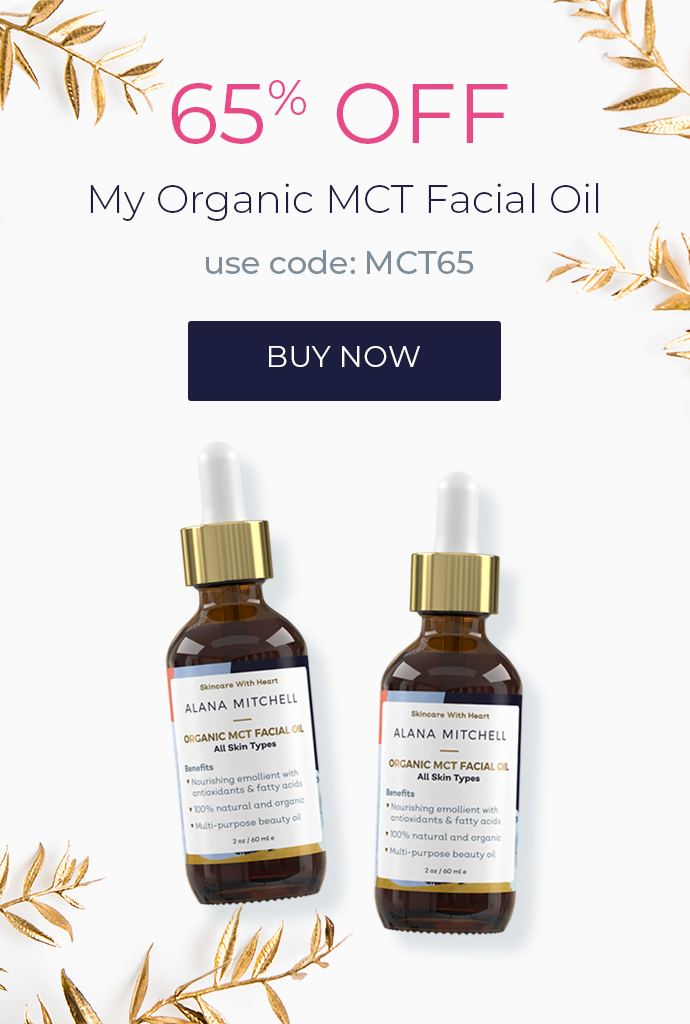What Should You Be Using In Your Skin Care Routine?
Take my quiz and get personalized recommendations from a
licensed esthetician!
Is Turmeric the New Coconut Oil?
If you browse through my blog, you’ll notice a slew of posts about wellness ingredients: chlorophyll and apitoxin - just to name a few!
These trends always fascinate me because they seem to blow up overnight.

They’re touted for their internal and external health benefits, but such claims usually aren’t backed by research.
I want you to make educated decisions about what you choose to put on and in your body, which is why I write about them!
Surprise, surprise: I’ve got another spicy ingredient (literally) for you today.
It’s turmeric!
It’s exploded in popularity for its multiple beauty uses, internal health benefits, and cooking purposes.
But how much truth is there to the claims we hear about turmeric?
Does it really work?
Keep on reading to find out!

What is Turmeric?
Turmeric (pronounced ter-mer-ic) is a plant that’s part of the ginger family, Curcuma longa, and is grown in India and Southern Asia.
It's been considered an important part of Indian culture for at least 4,000 years but has gotten a ton of attention lately.
You can purchase the whole root, a supplement form, or a dried powder.
How you use turmeric is really up to you!
Many people add a small amount of powder to their tea, soups, smoothies, and baked goods daily.
Supplements will have a higher concentration.
Known for its bright yellow-orange color and bitter taste, turmeric (or "haldi") is most often used in cooking as a spice to flavor curries and Indian cuisine.
It's also used to dye clothes yellow or orange because its color is long-lasting.
Turmeric is also known as "Indian saffron" for this reason.
Curcumin is the main component found in turmeric and gives it its color.
Fun fact: Before Indian weddings, turmeric paste is applied to the bride's skin as part of a ritual because it brings out a glow.

How Does Turmeric Help Skin?
Curcumin is known for its powerful anti-inflammatory benefits.
It can ease swelling and redness associated with skin conditions like acne, eczema, and psoriasis when used internally and externally.
It can even help control oil production.
Curcumin's antiseptic and antibacterial properties also help combat acne and it can be used to soothe minor cuts, burns, and wounds.
This is backed by a 2016 study, and other studies suggest that curcumin could help prevent dark spots and hyperpigmentation by halting the production of melanin.
To get these benefits, people have been using DIY recipes.
Turmeric and lemon juice have been used as a spot treatment for acne, while plain yogurt, manuka honey, and turmeric can be mixed and used as a face mask to lighten skin.
The spice is also an antioxidant, so it helps combat free radicals and UV damage that can age the skin.
A study was actually done on this and revealed that curcumin improved skin hydration and sebum content after photodamage.
There's also some evidence that curcumin has the potential to help treat skin cancer.
In a 2011 study, curcumin was found to inhibit the size and progression of squamous cell carcinoma (a type of skin cancer).
Another study found that it could even stop the spread of melanoma cells to surrounding tissue.
When ingested in supplement form, turmeric can also reduce collagen breakdown that results in fine lines and wrinkles, so it has some anti-aging abilities.
It's also generally well-tolerated by sensitive skin types.
Disclaimer: This stuff stains!
Star Wars actress Daisy Ridley shared an Instagram video in which she revealed she had stained her hands yellow when making a face mask! And it had happened before filming!
The moral of the story?
Be cautious with trying the many natural beauty DIYs out there!
For removal of stains on the skin, make a gentle sugar scrub for exfoliation or moisten a cotton ball with water and rub it across the skin.

What Are the Health Benefits of Turmeric?
One ounce of turmeric gives you 26% of the daily requirement of manganese and 16% of the daily requirement of iron.
It's also a great source of fiber, potassium, vitamin C, and vitamin B6.
One of the reasons why turmeric is in the spotlight is because it's been approached as a food and a medicine.
Users have reported that turmeric can work as well as prescription medications without the undesirable side effects.
Turmeric can help your body's metabolism work more efficiently and can serve as a natural liver detoxifier.
It may also help lower cholesterol levels and protect against heart disease.
The spice is also being studied to help with gastrointestinal problems, improve digestion, and assist with weight loss.
A study published in the American Journal of Geriatric Psychiatry suggests that curcumin in turmeric can improve memory and increase happiness.
As you already know, turmeric is used in Indian cuisine - and there's a lower rate of Alzheimer's in India than here in the U.S.
Researchers aren't sure how curcumin does this, exactly, but it could be due to its ability to reduce brain inflammation, which has been linked to Alzheimer's and major depression.
The benefits don't stop there!
Curcumin can also help relieve symptoms of migraines and muscle pain when taken in supplement form.
It may even help with arthritis treatment and reduce joint swelling.
Curcumin is even being researched to help fight cancer as it seems to kill cancerous cells and inhibit their movement throughout the body.
Wow - that was a lot of health info!

How Is Turmeric Used?
For a quick and easy way to get a health boost, heat turmeric powder with black pepper and coconut oil.
Supposedly, this mixture helps with bioavailability and absorption.
People are brushing their teeth with turmeric powder for its supposed ability to whiten teeth (actress Julianne Hough swears by it!).
However, dentists recommend sticking to good ol' whitening toothpaste.
Just because turmeric can be good for your internal organs doesn't mean it's good for your oral health (take brushing with apple cider vinegar, for example).
Turmeric lattes (AKA Golden Milk) were popular last summer as a vegan-friendly and healthy alternative to daily caramel lattes with whip.
Called "Haldi Doodh" in eastern cultures, turmeric lattes been around for centuries and are touted for their medicinal benefits.
You can make one for yourself at home using almond or coconut milk, turmeric, ginger, ground pepper, honey, and cinnamon.
Gwyneth Paltrow and Kourtney Kardashian are just a couple of its famous fans.
If you haven't already noticed from reading, there sure are a lot of celebs hopping on the turmeric trend!
However, this doesn't mean it's right for your skin or your body - more on that in a minute!

Are There Any Side Effects of Using Turmeric?
You’ve heard the saying before: too much of a good thing can be a bad thing.
While negative side effects are rare, they’re possible.
According to Amanda Barnes, RD, if you’re taking turmeric supplements plus blood thinners or painkillers, this could lead to increased bleeding when cut, during a menstrual period, or if you’re susceptible to bloody noses.
Additionally, high doses of turmeric may cause gastrointestinal upset, such as bloating, nausea, vomiting, stomach aches, and/or diarrhea.
In extreme cases, it can even cause anemia.
As for skin application, I recommend performing a patch test.
If you want to use a spot treatment or face mask with turmeric, mix it up and let it sit on the back of your wrist for 10 minutes.
Rinse it off, and then wait for 24 hours to see if you have a reaction.
Sadly, a woman who was being treated for eczema died after her naturopathic doctor gave her a turmeric IV.
Although she had taken turmeric supplements before, she never had received an infusion.
I strongly recommend consulting with a licensed dermatologist before using alternative treatments.
Unfortunately, she and her doctor didn't know that turmeric and her underlying medical problems would lead to her death.
I don't mean to scare you; I just want this to serve as a cautionary tale.

How Much Turmeric Is Safe?
Curcumin can actually give false signals in drug screening tests.
And, a recent study revealed that there isn't enough evidence that curcumin has therapeutic properties and that the body doesn't easily absorb it.
I know that things can get confusing because earlier I mentioned that other studies have shown that curcumin can have medicinal benefits.
My words of wisdom are that if something sounds too good to be true, it probably is.
It shouldn't be a replacement for your daily prescriptions that you need.
As for quality, differences in manufacturing can also skew research results and yield different conclusions.
This is why it's recommended to purchase 100% natural turmeric with no additives.
If you’re pregnant, prone to bloody noses, or are on medication, talk to your doctor before consuming it or applying it to the skin.
The recommended dose of turmeric for culinary purposes are 1.5-3 grams per day for fresh roots and 400-600 milligrams three times per day for the powdered spice.
Powdered turmeric should be stored in a cool, dry place, and boiling it for 15 minutes can destroy up to 85% of its curcumin content.
So, it's best to add it after you remove your food from heat.
This can go without saying, but those with a turmeric allergy shouldn’t use it.
Final Thoughts
While they’re not always backed by research, the popularity of wellness trends shows that people do care about their skin’s health and acknowledge that what we use internally and externally can yield results.
Remember when coconut oil had its moment in the spotlight for skin, health, and cooking?
I think turmeric is going through something similar!
It seems like it can do everything, right?
However, as we've noticed, benefits of "healthy" foods can get blown out of proportion.
I personally don't expect turmeric to be the cure-all that it's positioned as.
At the very least, it has one benefit: it tastes good!
As always, err on the side of caution and talk to your doctor before taking turmeric supplements.
Click Here to learn more ways to keep your skin and body healthy!
Beauties, have you jumped on the turmeric train? How have you used it? Or are you skeptical of the hype? I’m eager to hear your thoughts in the comments!
Top Brands
New Brands

Recent Posts

Are You Taking the Right Steps to Care for Your Skin?
Take the Quiz
Skincare Secrets!
10-step guide for healthy, beautiful skin after kids.
100% privacy. I will never spam you!













